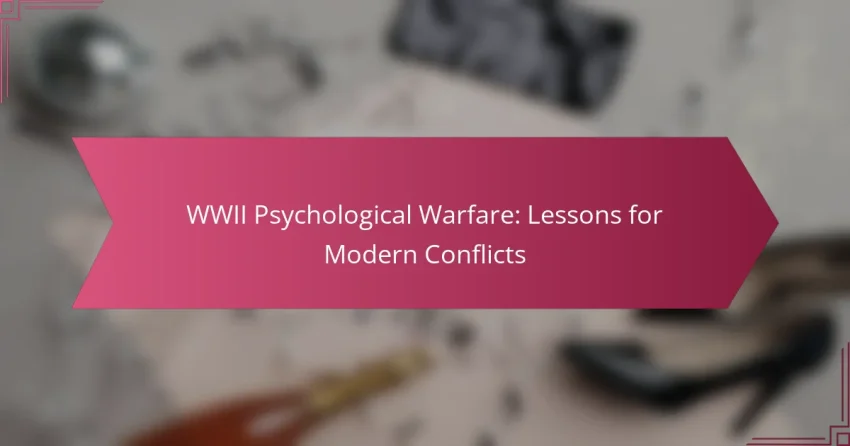World War II marked a pivotal moment in the evolution of psychological warfare, showcasing how the manipulation of public perception and morale could alter military outcomes. The techniques developed during this era, such as deception strategies and media manipulation, continue to inform modern military and political strategies aimed at influencing both enemy behavior and public opinion. By learning from these historical lessons, contemporary forces can enhance their operational effectiveness in today’s complex conflict environments.
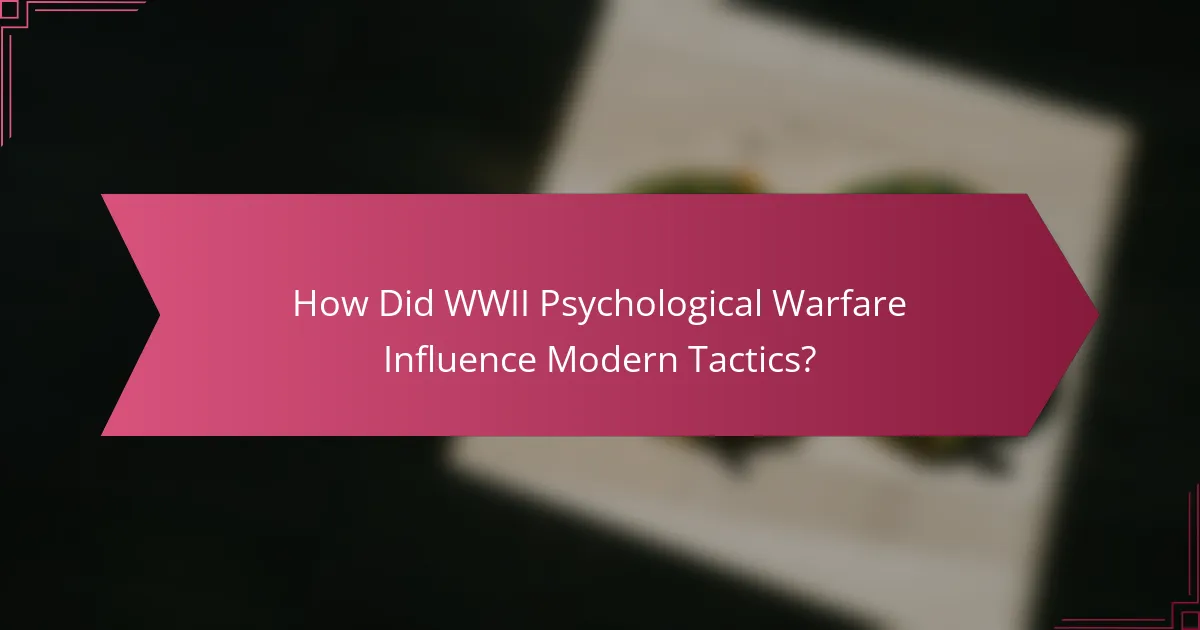
How Did WWII Psychological Warfare Influence Modern Tactics?
WWII psychological warfare set the foundation for modern tactics by demonstrating the effectiveness of manipulating public perception and morale. Today, military and political strategies continue to leverage psychological operations to influence enemy behavior and public opinion.
Use of propaganda
Propaganda during WWII was a powerful tool used to shape narratives and bolster support for the war effort. Governments crafted messages that targeted specific audiences, often using emotional appeals to instill fear or inspire patriotism.
Modern propaganda employs similar techniques, utilizing social media and digital platforms to reach broader audiences quickly. Effective propaganda today often focuses on creating compelling visuals and narratives that resonate with cultural values and current events.
Psychological operations in military strategy
Psychological operations (PSYOP) in WWII involved disseminating information to mislead or demoralize enemy forces. These operations were integral to military strategy, often executed alongside traditional combat to enhance overall effectiveness.
In contemporary conflicts, PSYOP remains crucial, with a focus on cyber warfare and information dominance. Military planners now integrate psychological tactics into broader strategies, ensuring that operations not only achieve physical objectives but also influence the psychological state of adversaries.
Case studies of successful campaigns
One notable case from WWII is the Allied deception operations leading up to D-Day, which misled German forces about the invasion location. This successful psychological campaign significantly contributed to the Allies’ ability to secure a foothold in Europe.
In modern contexts, the use of misinformation during the Gulf War showcased how psychological tactics can shape perceptions and outcomes. By controlling narratives, military forces can create confusion and uncertainty among opponents, leading to strategic advantages.
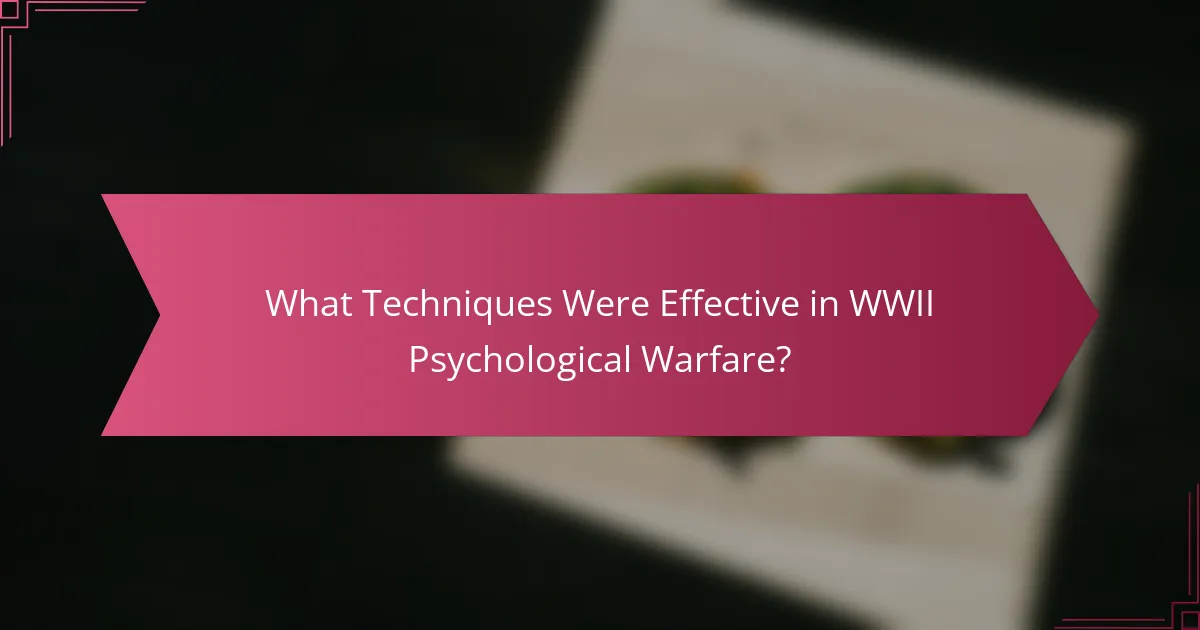
What Techniques Were Effective in WWII Psychological Warfare?
World War II saw the implementation of various psychological warfare techniques that significantly influenced military outcomes. Effective methods included deception strategies, media manipulation, and targeting enemy morale, each designed to undermine the opponent’s confidence and decision-making capabilities.
Deception strategies
Deception strategies involved creating false narratives or misleading information to confuse and mislead the enemy. Techniques such as feints, decoys, and misinformation campaigns were commonly employed to divert attention from actual military operations. For example, the Allies used inflatable tanks and aircraft to simulate troop movements, leading the Axis forces to misallocate their resources.
When planning deception, consider the timing and the credibility of the information. Effective deception often relies on the enemy’s existing beliefs and expectations. A well-timed, believable deception can create significant advantages on the battlefield.
Media manipulation
Media manipulation played a crucial role in shaping public perception and enemy morale during WWII. Governments utilized propaganda through newspapers, radio broadcasts, and films to promote their narratives and demoralize opponents. This included exaggerating enemy failures and downplaying their successes to maintain public support and morale.
To effectively manipulate media, focus on consistency and repetition of key messages. Ensure that the information aligns with the broader strategic objectives. Misleading or contradictory messages can backfire, eroding credibility and trust.
Targeting enemy morale
Targeting enemy morale involved strategies aimed at weakening the psychological resilience of opposing forces. This could include disseminating rumors of impending defeat or highlighting the suffering of enemy troops. The goal was to instill doubt and fear, leading to decreased combat effectiveness.
To effectively target morale, identify the vulnerabilities of the enemy’s psychological state. Use tailored messaging that resonates with their fears and concerns. However, be cautious not to overreach, as excessive negativity can lead to unintended consequences, such as rallying the enemy’s resolve.
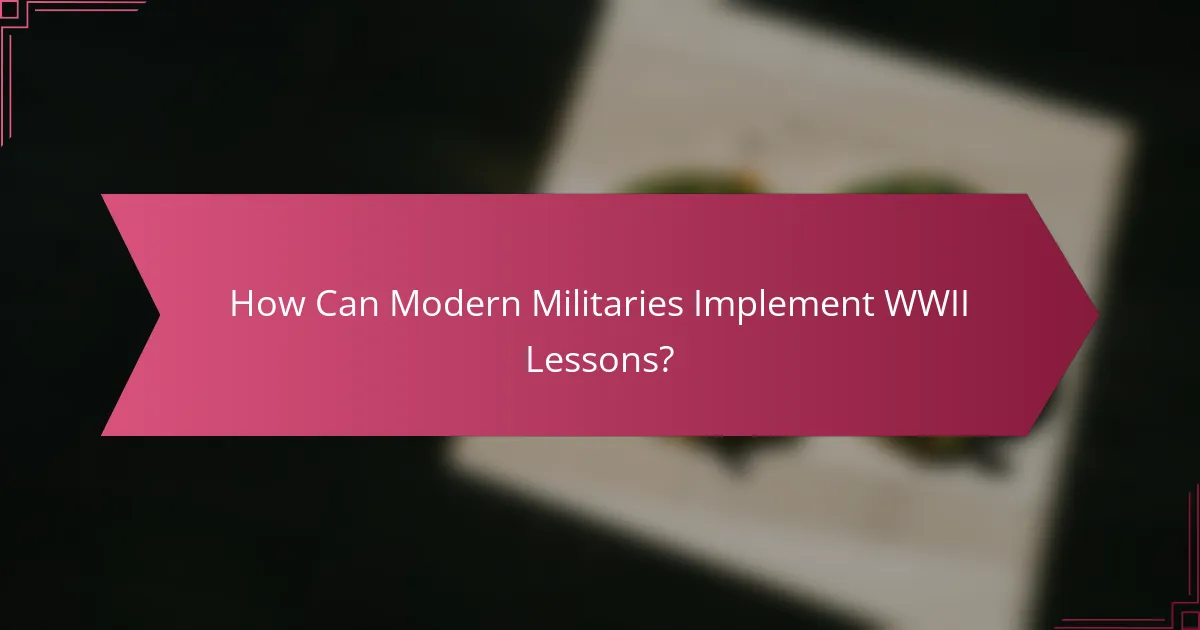
How Can Modern Militaries Implement WWII Lessons?
Modern militaries can implement lessons from WWII by focusing on psychological operations, training for resilience, and integrating advanced technologies. These strategies enhance operational effectiveness and adapt to contemporary conflict environments.
Adopting psychological operations
Psychological operations (PSYOP) are essential for influencing enemy perceptions and morale. Modern militaries should develop tailored PSYOP campaigns that leverage social media, misinformation, and targeted messaging to disrupt adversary decision-making.
For effective PSYOP, it is crucial to understand the cultural context of the target audience. This includes analyzing local beliefs, values, and communication channels to craft messages that resonate and achieve desired outcomes.
Training for psychological resilience
Training for psychological resilience involves preparing military personnel to cope with stress and uncertainty. Programs should include mental health resources, stress management techniques, and simulations that mimic high-pressure scenarios.
Regular workshops and peer support systems can enhance resilience. Encouraging open discussions about mental health and providing access to counseling can significantly improve the overall well-being of service members.
Integrating technology in warfare
Integrating technology into warfare can amplify psychological strategies. Tools such as drones, artificial intelligence, and data analytics can provide real-time insights into enemy behavior and vulnerabilities.
Militaries should invest in technologies that facilitate rapid information dissemination and counter-disinformation efforts. For instance, using AI to analyze social media trends can help identify and counteract false narratives before they gain traction.
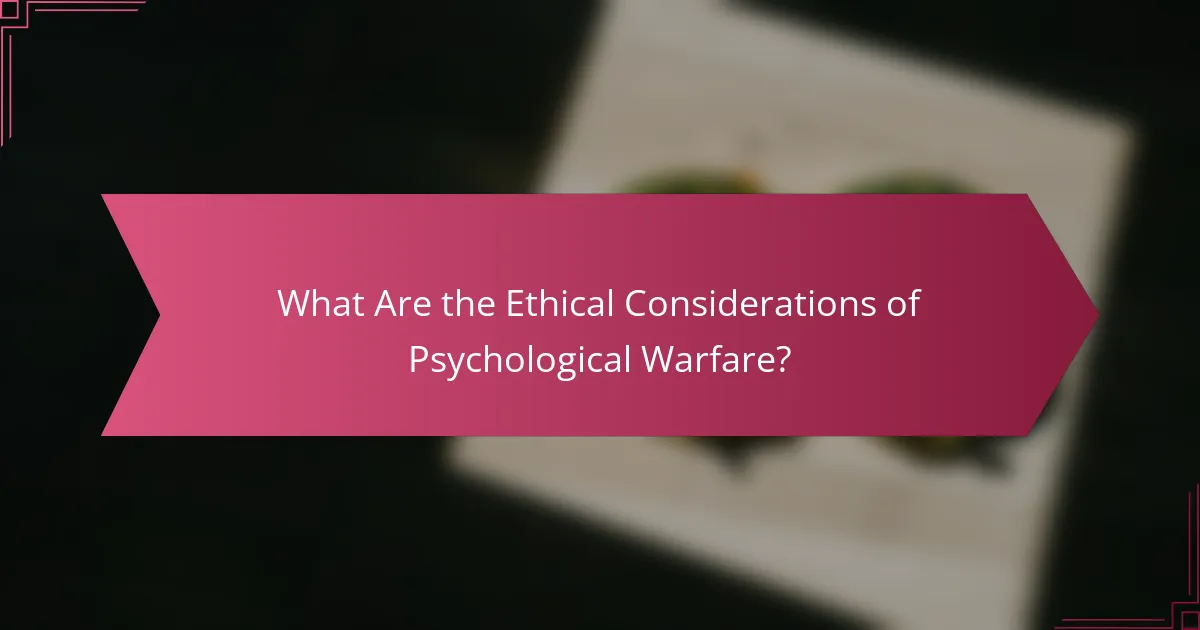
What Are the Ethical Considerations of Psychological Warfare?
Psychological warfare raises significant ethical concerns, particularly regarding the manipulation of human emotions and beliefs. It often involves tactics that can harm innocent civilians, leading to long-lasting trauma and societal disruption.
Impact on civilian populations
The impact of psychological warfare on civilian populations can be profound and damaging. Tactics such as propaganda, misinformation, and fear tactics can create distrust among communities, leading to social fragmentation. Civilians may experience heightened anxiety and uncertainty, affecting their daily lives and mental health.
For example, during WWII, leaflets were dropped to demoralize enemy troops and civilians alike, often leading to panic and chaos. Such tactics can have ripple effects, influencing public sentiment and behavior long after the conflict has ended.
Long-term psychological effects
The long-term psychological effects of psychological warfare can persist for years, manifesting as PTSD, depression, and anxiety disorders among affected populations. Individuals exposed to psychological manipulation may struggle with trust issues and fear, impacting their ability to reintegrate into society.
Research indicates that the psychological scars from such tactics can last generations, as trauma can be passed down through families. Communities may find it challenging to recover, leading to cycles of violence and instability.
Legal frameworks governing warfare
Legal frameworks governing warfare, such as the Geneva Conventions, provide guidelines on the conduct of armed conflict, including the treatment of civilians. However, psychological warfare often operates in gray areas, making it difficult to enforce existing laws effectively.
International law prohibits actions that cause unnecessary suffering or target civilians, yet psychological tactics can blur these lines. Nations must navigate these complexities carefully to avoid violating ethical standards and international regulations.
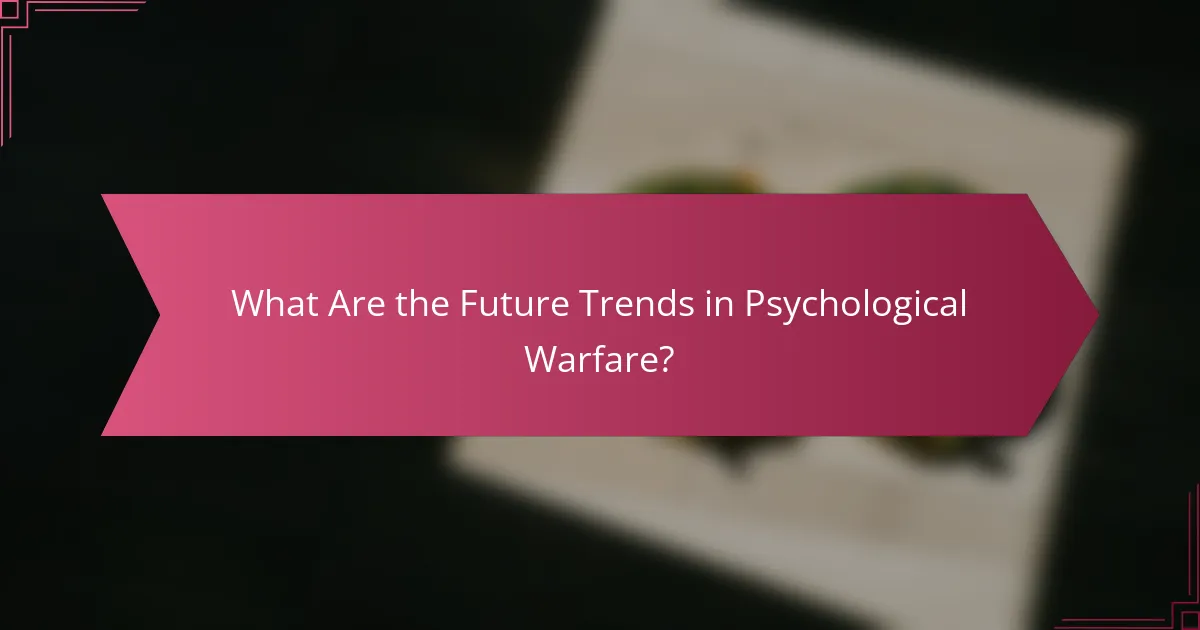
What Are the Future Trends in Psychological Warfare?
Future trends in psychological warfare are increasingly shaped by advancements in technology, particularly in cyber warfare and artificial intelligence. These developments enable more sophisticated manipulation of information and public perception, making psychological operations more effective and pervasive.
Cyber warfare implications
Cyber warfare significantly alters the landscape of psychological operations by allowing for rapid dissemination of misinformation and targeted propaganda. Nation-states and non-state actors can exploit social media platforms to influence public opinion, disrupt societal cohesion, and create confusion among adversaries.
To effectively counter cyber psychological warfare, organizations should invest in robust cybersecurity measures and develop strategies for identifying and mitigating misinformation. Regular training for personnel on recognizing fake news and understanding the psychological tactics used in cyber operations is crucial.
AI in psychological operations
Artificial intelligence enhances psychological operations by enabling the analysis of vast amounts of data to identify vulnerabilities in target populations. AI can tailor messages to specific demographics, increasing the likelihood of influence and engagement.
However, the use of AI in psychological warfare raises ethical concerns and potential backlash. Operators must balance the effectiveness of AI-driven campaigns with the risk of alienating the target audience. Establishing clear guidelines and ethical standards for AI use in psychological operations is essential to avoid unintended consequences.
